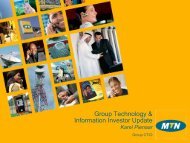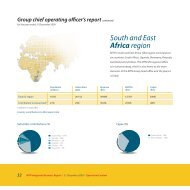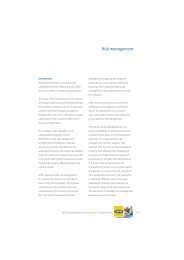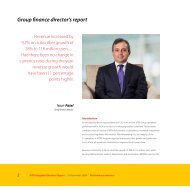(formely M-Cell Limited) - Business Report 2003 - MTN Group
(formely M-Cell Limited) - Business Report 2003 - MTN Group
(formely M-Cell Limited) - Business Report 2003 - MTN Group
You also want an ePaper? Increase the reach of your titles
YUMPU automatically turns print PDFs into web optimized ePapers that Google loves.
PRINCIPAL ACCOUNTING POLICIES<br />
FOR THE YEAR ENDED 31 MARCH <strong>2003</strong><br />
A glossary of terms and acronyms utilised in this report is provided on page 53.<br />
1. PRESENTATION OF FINANCIAL STATEMENTS<br />
These financial statements are presented in South African Rand since that remains the dominant functional<br />
currency of the <strong>Group</strong>. The functional currencies of individual operations are the local currencies in those<br />
territories within which they operate, except for <strong>MTN</strong> Mauritius whose functional currency is the US dollar.<br />
In the current year’s financial statements, the following principal accounting policies were consistently applied in<br />
all material respects with those of the previous year, except for the change in accounting policy in respect of<br />
connection incentives, which is disclosed in note 2.9 below.<br />
2. SUMMARY OF PRINCIPAL ACCOUNTING POLICIES<br />
The financial statements have been prepared under the historical cost convention in accordance with South African<br />
Statements of Generally Accepted Accounting Practice (SA GAAP) and the requirements of the South African<br />
Companies Act.<br />
2.1 Basis of consolidation<br />
The <strong>Group</strong> consolidated financial statements incorporate the financial statements of <strong>MTN</strong> <strong>Group</strong> <strong>Limited</strong><br />
and all its subsidiaries, joint ventures, associates and special purpose entities (including insurance cell<br />
captives) for the year ended 31 March <strong>2003</strong>.<br />
Control is achieved where the <strong>Group</strong> has the power to govern the financial and operating policies of an<br />
investee enterprise so as to obtain benefits from its activities.<br />
The results of subsidiaries acquired or disposed of during the year are included in the consolidated income<br />
statement from the effective date of acquisition or up to the effective date of disposal, as appropriate.<br />
All material intercompany transactions and balances between <strong>Group</strong> enterprises are eliminated on<br />
consolidation.<br />
The purchase method of accounting is used to account for the acquisition of subsidiaries. The cost of an<br />
acquisition is measured as the fair value of the assets given up, shares issued or liabilities undertaken at the<br />
date of acquisition plus costs directly attributable to the acquisition. The excess of the cost of acquisition<br />
over the fair value of the net assets of the subsidiary acquired is recorded as goodwill.<br />
Where necessary, accounting policies of subsidiaries have been changed to ensure consistency with the<br />
policies adopted by the <strong>Group</strong>.<br />
2.2 Interests in joint ventures<br />
A joint venture is a contractual arrangement whereby the <strong>Group</strong> and other parties undertake an economic<br />
activity which is subject to joint control.<br />
Joint venture arrangements which involve the establishment of a separate entity in which each venturer<br />
has an interest, are referred to as jointly controlled entities. The <strong>Group</strong> reports its interests in jointly<br />
controlled entities using the proportionate consolidation method of accounting. The <strong>Group</strong>’s share of the<br />
assets, liabilities, income and expenses of jointly controlled entities are combined with the equivalent items<br />
in the consolidated financial statements on a line-by-line basis.<br />
Where the <strong>Group</strong> transacts with its jointly controlled entities, unrealised profits and losses are eliminated to<br />
the extent of the <strong>Group</strong>’s interest in the joint venture except where unrealised losses provide evidence of<br />
an impairment of the asset transferred.<br />
2.3 Interests in associated companies<br />
An associate is an enterprise over which the <strong>Group</strong> exercises significant influence with respect to its<br />
financial and operating policies but which it does not control, jointly or otherwise.<br />
Investments in associated undertakings are accounted for using the equity method of accounting.<br />
The carrying amount of such interests is reduced to recognise any decline, other than a temporary decline,<br />
in the value of individual investments.<br />
The <strong>Group</strong>’s share of post-acquisition accumulated profits and other reserves of associated companies,<br />
which is generally determined from their latest audited financial statements, is included in the carrying<br />
value of the investments.<br />
Where another group entity transacts with an associate of the <strong>Group</strong>, unrealised profits and losses are<br />
eliminated to the extent of the <strong>Group</strong>’s interest in the relevant associate, except where unrealised losses<br />
provide evidence of an impairment of the asset transferred.<br />
PAGE 70<br />
<strong>MTN</strong> BUSINESS REPORT <strong>2003</strong>
















